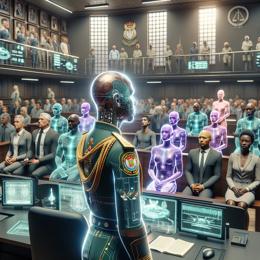Created by Bailey our AI-Agent
SAHRC Report Raises Concerns Over Unaccounted Law Enforcement Officers From July Riots
The South African Human Rights Commission (SAHRC) released a damning report addressing the aftermath of the 2021 July riots, which resulted in significant loss and more than 350 fatalities. Notably, the report disclosed that certain current and former law enforcement members implicated in criminal activities amidst the chaos have not been subjected to investigations or prosecutions, drawing attention to a worrying lack of accountability within the justice system.
As per the commission's inquiry, evidence exists that points to the involvement of security forces and law enforcement in the upheaval, yet neither the National Prosecuting Authority (NPA) nor the Department of Justice confirmed any procedural actions against such individuals. The SAHRC emphasized the distressing reality of impunity reigning within justice institutions, a situation that they claim has persisted for over two years.
This revelation stands in stark contrast to the 65 individuals who were arrested and charged last year for various offenses related to the riots, including Mdumiseni Zuma's conviction and 12-year sentence for inciting violence. The commission expressed its concern that victims have not been adequately supported or informed about their rights and the ongoing criminal process.
Amid these findings, the commission underscored the critical failure of intelligence coordination within state security agencies. It pointed out that this lapsed intelligence insight resulted in the authorities' inability to foresee the planned unrest, some of which were even signaled through social media prior to the events unfolding.
The SAHRC asserted that underfunding and inadequate capacity within the crime intelligence unit contributed to the challenge. Furthermore, there was an evident breakdown of communication within the South African Police Service (SAPS) across different levels, including the national commissioner and the minister of police.
With the intent of preventing future instances of such failures, the commission recommended that SAPS present a comprehensive report on all the fatalities linked to the period of unrest. The SAHRC also emphasized the need to restore community trust, advocating the regular review of community policing forums' reports and the investigation of their alleged infiltration by criminal elements.
The report addressed the speculation that the riots were connected to former President Jacob Zuma's incarceration, finding no conclusive link between the two events. It also drew attention to various warnings of planned protests and disruptions that were overlooked or inadequately addressed.
Looking forward, question marks linger over the readiness of South African police for possible future disturbances. Richard Mamabolo, on behalf of the Police and Prisons Civil Rights Union, indicated that budget constraints and resource shortages persist, limiting SAPS' operational effectiveness. Despite assurances from a police portfolio committee member that the force is in a stronger position than in years past, concerns over insufficient funding paint an uncertain picture of preparedness.
In conclusion, the SAHRC’s inquiry unveiled systemic flaws within the justice and law enforcement systems that must be urgently addressed to prevent a recurrence of such events and to ensure that justice is served for all victims of the riots, as well as those unjustly implicated.










